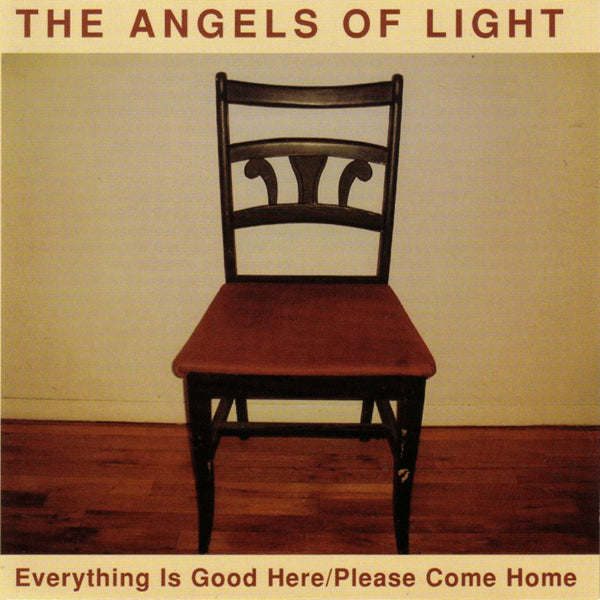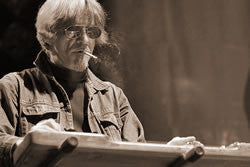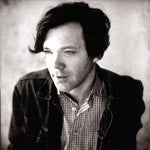Everything Is Good Here / Please Come Home
Angels Of Light

Everything Is Good Here / Please Come Home
Angels Of Light
YG22
Here’s a press release below from 2003, when Everything Is Good Here was released
– Michael Gira/Young God Records 2008
A NOTE FROM MICHAEL GIRA/ANGELS OF LIGHT/SWANS/YOUNG GOD RECORDS:
I once had a band called Swans, based here in NYC. It lasted 15 years. We released a ridiculous amount of albums along the way, and they seem to have had an influence and/or effect (bad and good!) on a fair number of people. In 1999 I started my new band, The Angels of Light, at which point (I hope), I left my past behind. This is the 3rd Angels album. It started, innocently enough, with the intent of being a simple collection of well-written songs performed by the musicians who played them live for the last few years, with the addition of a few acoustic songs, lightly colored. Instead, as things often seem to go around here, I ended up saturating every available molecule of the recording tape with sound, then hacked, cut, poured sonic fertilizer/salt on the resultant wounds, and it finally metastasized into this raging/weeping BEAST, which in the end succeeded in slowly biting off my head, leaving this album behind as evidence. Some songs might be construed as sad or poignant, and others "rock" in a weird, skewed way, I suppose.
The way I work as a producer is first to follow the visual picture I had of the song's final outcome when I wrote it - then eventually throw out all my high fallutin' ideas/dreams, remaining open to chance, "mistakes" (especially), random juxtapositions, blind alleys, and most importantly, the input of others. The results here are sometimes subtle, sometimes excessive, but I think I've managed to sort through the chaos, letting the songs discover themselves. So, it's densely orchestrated in some places, sparse in others. It is much, much different than the first two angels albums. A few friends say it's a "breakthrough" or some such thing, but believe me, the thing controlled me, I did not control it. Maybe that's why, after about 20 years of making records, I think it's one of the best things I've done. In retrospect, it seems the subject matter of the songs is my response to disasters/cataclysms personal/historical/political - with a few exceptions, 2 of which are my versions of fairy tales, and the other a simple love song.
The instrumentation is all over the place, initially built up from my acoustic guitar and voice, then incorporating everything from electronic noise, to banjo and mandolin, to bass-drums-electric guitar, to (open-tuned) lap steel guitar, to vibraphones and marimbas, to accordion, fiddles, and flutes (yes, flutes), to the dreaded children's choir, to layered vocal harmonies, to drones acquired from various organic sources, to piano and fender Rhodes, to trumpet and trombone. Where does it fit in the current musical environment? Nowhere, I'm sure. It's a gift for the befuddled, the rancorous, the deluded, the chosen, the failed and the insane, the crazed and misguided, the spiritual seekers, the hungry, the numb, the inveterately passive, the secretly angry over-achievers, the blandly normal, the well-primed consumers, and the mildly, distracted curious - Oh, and You, of course. I hope you'll listen. It was made with LOVE, believe it or not, and it's as close as I can come to a purity of intent. These are my songs, but the musicians/friends that contributed to these recordings are stellar, in my opinion, and in all cases their performances forced me to view the final arrangements in a new, unfamiliar and often uncomfortable, light the best place to be. I can't think of anything that would be less fulfilling than ending up with something that sounded exactly as I'd planned it from beginning to end.
Here's who played on these recordings: Christoph Hahn: open tuned lap steel guitar, electric guitar; Dana Schechter: bass guitar, piano, voice, toy organ; Thor Harris: percussion, vibraphone, piano; Larry Mullins: drums, percussion, vibraphone, farfiza organ, synthesizer, voice. Additional musicians include: Joe McGinty: piano, fender rhodes, harmonium; David Garland: flutes, accordion; Bryin Dahl: treated/electronic guitar; Eszter Balint: violin/fiddle; Herr Kid Congo Powers: electric guitar; Patrick Fondiller: mandolin, bass guitar; Kevin O'Connor: banjo; Steve Moses: trombone; Larry Moses: trumpet; David Coulter: violin, banjo, children's choir arrangement. Siobhan Duffy: background vocals; little Devendra Banhart: background vocals, gnomish mascot; Martin Bisi: recorded and mixed at BC Studios, with Martin engineering. What I did on the recordings: Michael Gira: voice, acoustic/electric guitar, harmonica, stupid piano, production.
NOTE: This album was made possible by the sale of the Angels of Light Live Cd We Were Alive! It was old exclusively at www.younggodrecords.com with the express purposes of funding this CD. Thanks go to a core cult of blithely optimistic fans!
HERE ARE A SOME REVIEWS (more press):
12/1/2003 | pitchfork.com | by Brandon Stosuy
Angels of Light | Everything Is Good Here/Please Come Home
Pitchfork 'best of 2003' issue
On the Angels of Light's epic third album, frenzied dirges, pagan laments, and celebratory incantations build tension like Poe's tightest tales and then, without fail, release a piss-storm of Old Testament wrath as redemption. In the CD booklet is a picture in which a copy of Godspeed You! Black Emperor's Yanqui U.X.O. rests atop a pile of mail, papers, and musical detritus-- the homage is intentional, yet while The Angels of Light share Godspeed's sense of protracted anguish and triumph, Angels frontman Michael Gira did it first with Swans, and still does it better. Practicing compassionate masochism through visceral intrusions rather than suggesting global politics through facelessness, static diagrams and expected loud/soft dynamics, Gira embodies disaster and its attendant unpredictability, concocting a breakneck prophetic power struggle that comes off like holy writ. Or at least the orchestral punk-rock edition of Paradise Lost.
3/4/2003 | All Music Guide | Ned Raggett
Angels of Light | Everything is Good Here... | Review
AMG rating: ****
Having created some of the strongest music in his life on the previous Angels of Light album, on Everything is Good Here Michael Gira maintains the winning streak but explores a newer, more controlled delicacy. It's hardly a new move for him, of course, but in ways this album, the third in the Angels of Light guise, finds his extremes of harrowing, wrenching music and performance and a calmer, almost mystic approach more integrated than ever before. The drama in his vocals and arrangements are more than even implicit instead of directly blasting, to beautiful and powerful effect. "Palisades" sets this tone from the start, incorporating everything from backing choirs and dank, dark riffs to the quietest of arrangements into one cohesive performance. Other songs that hit the balance just right include "Nations," with its quiet, persistent vibes part a counterbalance to the more insistent guitars and piano, and the incredible "Sunset Park," words delivered as a steady mantra over a surging slow burn performance that feels like a triumphant march. Gira's gift for ritualistic theatricality certainly hasn't left him, as even a casual listen to the increasingly frenetic "All Souls' Rising" — keep an ear out for the almost stabbing vocal bursts — or the even more freaked out "Rose of Los Angeles" shows. On the quieter side through and through, "What You Were," with Gira's cracking vocals and piano providing the centerpiece, is the album's hidden treasure, the lyrics of loss, regret and mystery particularly compelling. Both Gira's core backing musicians and the many guests throughout contribute incalculably to the end result, whether it's Larry Mullins's always excellent percussion or David Coulter's work with everything from violin ("Kosinski") to a children's choir.
3/5/2003 | Wire Magazine/March 2003 | Tom Ridge
Angels of Light | Everything Is Good Here | Review
it looks forward rather than back
This is a troubled record. It broods, it glowers menacingly. It possesses an intensity which brings Michael Gira around full circle, back to Swans, even as it builds on the foundations of Angels of Light¹s earlier work. That¹s to say: it looks forward rather than back. Gira sings in a variety of voices, from a weary, cracked croon to a declamatory shout, from considered musings to rising hysteria. The production has broadened to encompass massive surges in sound, contrasted with intricate, interwoven melodies. It begins with ³palisades², a damaged lullaby of a dirge that sounds, paradoxically, merciless and tender. ³Do you see how they ruined your mind? Do you see how they wasted your like?² Gira sings. ³All Souls¹ Rising has an enormous, pulsating sound, ruptured by the singer¹s bitter, preaching drawl, as it builds to a frenzy of self-flagellation. ³Kosinski² casts him as a narrator describing his obsession: ³When the light shows through your window/I can see you there in the mirror/touching blond hair that¹s a river of translucent, liquid light.² Thematically, it recalls ³Evangeline², from How I Loved You, with Gira an unseen voyeur describing the object of his desire. Qualified by a sense of pain that love can bring with it, his romanticism is ambiguous. He describes love, in ³Family God², as ³an endless ache², and his weary murmur gives way to something edgier midway through ³What You Were², suddenly dropping his mask of tenderness. These intricate concerns are projected on a backdrop of ambitious musical arrangements that encompass broader, apocalyptic themes. The somber ³Nations² is perhaps too obvious lyrically, but an unrelenting air of menace arises from it¹s unstoppable momentum. Closing the album, ³What Will Come² is another dirge-like waltz. It sounds fragmented, with Gira¹s voice weakened and wasted even as he calls for some kind of redemption. With buzzsaw guitar noise disturbing his meditation, he calls out, ³Save us from what will comeŠ² Yet you don¹t so much hear uncertainty as resignation in his voice, as if Michael Gira already knows.
Angels of Light
Everything Is Good Here/Please Come Home
[Young God; 2003]
To a certain extent, most of us are still living sheltered lives, insofar as we rarely confront our spirituality, reject our families, or cross our internal lines of social decency. Beliefs and codes vary from person to person like wardrobes, but very few people are willful, foolish or terminally self-aware enough to defy their own. Cultural expectations-- "absurd and malignant" or otherwise-- have sway, and the precious, indecent few who manage to outrun them are generally viewed as outcasts or criminals (though sometimes, as prophets). Aside from whatever law they break, criminals rob us of our conventions: through acts of violence and upheaval, they force us to confront our boundaries. For some, ignoring the tenuous line between right and wrong is an easy feat, but for others, personal demons are as controlling as any backlog of cultural norms. From the sound of Everything is Good Here/Please Come Home, Angels of Light (and Young God figurehead Michael Gira) may yet have demons to master, and boundaries to set.
Gira broached straightforward indecency long ago, via his most infamous and acclaimed project, Swans. In the mid-80s, when even the most ruthlessly earnest punks were only beginning to come to terms with a "responsible" definition of anarchy, Gira and then-partner Jarboe were speaking--sometimes literally-- of masochistic torture and humiliating, brutal sex, over drastically compressed drones and industrial propulsion. When the decade closed in an alternative rock flourish, Swans thrust forward by leaps and bounds: Love of Life, The Great Annihilator and especially Soundtracks for the Blind predicted Godspeed You Black Emperor! and all manner of dark-ambient music, though thematically, Swans still seemed to equate God with a dominatrix. Gira's post-Swans (read: post-Jarboe) folk collective, The Angels of Light, matches his previous band's penchant for mythic grandeur, with more muted dynamics, if not sentiment. Everything Is Good Here is their third release, and it's as disturbing as it is wonderful.
According to Gira, the album is a response to various personal, historical and political disasters. In some ways, that cryptic declaration takes the edge off the songs, as without pretense there's vast room for interpretation in his lyrics. Where "Palisades" might read as a particularly bitter response to suicide-- "Reasons won't come/ And no one will regret that you're gone"-- it could as easily lament claustrophobic personal terror: "Do you see how they ruined your mind? Do you see how they ruined your life?" Gira's smoke-stained baritone barely carries the words over acoustic guitar and delicate bell-tones, though later he verges on overtaking a serene arrangement of church bells and a children's choir. The altogether peaceful "Kosinsky"-- with its deft, gently strummed electric guitar and bright fiddle motif-- initially reads as a tender love song; Gira's description of hair like "translucent, liquid light" and the "rhythm of your breathing" seem poignant, though he again blurs boundaries by admitting he looks on his love with "the eyes of an animal."
The textural range of Everything Is Good Here lends an epic, almost timeless quality that goes a long way toward fleshing out Gira's often-mythological way with words. "All Souls' Rising" features impressions of pagan ritual, and self-purification via "the cull of foreign bone" and forcing "the blue smoke in... [to] fill the sack of skin." The relentless hammer of drums and murky stew of bass, organ and guitar-- not to mention Gira's own droning war cries-- conjure scenes of violent sacrifice and the chaotic laws of a still-dominant Earth.
Contrarily, the midtempo, near-Beatles "Sunset Park" reveals little in its single repeated line, "She brings some/ She'll bring one," but betrays a brilliant optimism in Gira's simple, dignified melody, and wall of shimmering guitars. Later, on "Wedding", an extended, gently strummed introduction is offset by ominous brass tones and the dissonant children's choir, giving way to Gira's rugged moan. The choir caps each phrase with angelic harmonies, quite removed from the intentionally grotesque sound of Swans, or even scattered moments on this album. As a whole, Everything Is Good Here is at once breathtaking and, like a great many Gira releases, simply too much.
The overwhelming impression is one of acceptance and redemption, despite repeatedly bleak (or at best, mysterious) narration from Gira. The production helps, but digging deeper into its lyrics, it seems that, rather than prolong an inner struggle, Angels of Light seek salvation. "What Will Come" openly requests that God "save us... from what will come," though it's difficult to reconcile Gira's leap of faith after an album's worth of explicitly self-empowering, judgmental narrative, clouded by contradiction. Nevertheless, music that resonates with as much emotional weight and vital abandon is rare, and though I'm less inclined to look for answers in the mix than revel in its chaos, Everything Is Good Here/Please Come Home is a commendable, heady experience.
-Dominique Leone, January 21st, 2003/www.pitchforkmedia.com
Music Reviews
Jim Knipfel/THE NEW YORK PRESS
JANUARY 22, '03
Everything Is Good Here
Angels of Light
(Young God)
Since the Swans broke up after 1996¹s Soundtracks for the Blind, Michael Gira has remained one of the busiest men in music. His Brooklyn-based label, Young God Records, has released dozens of albums by an international collection of jazz, rock, noise, folk and experimental groups. He¹s repackaged several old Swans records, released a spoken-word album and recorded his own music with a variety of musicians and under a variety of monikers‹the Body Lovers, the Body Haters and Angels of Light.
Each post-Swans bands had a different attitude. The Body Haters was pure, rabid noise. The
Body Lovers was noisy too, but more refined. Of them all, Angels of Light remains the most
direct descendant of the Swans, continuing along the same trajectory the Swans were following when they broke up. That is to say, the songs on this third Angels of Light album bear no resemblance whatsoever to early Swans recordings. There are tunes here, and real singing, and more traditional song structures (and all the songs come in at under seven minutes). There are plenty of acoustic numbers, too. Not to say that there aren¹t the occasional howls and explosions of sharp noise and untuned guitars‹but there¹s plenty else going on there as well.
Gira¹s working here with a massive array of musicians, playing not only the traditional guitars and percussion, but piano, violin, banjo, mandolin, dulcimer, keyboards‹and a multitude of sound effects.Though I certainly hesitate to use the word "delicate" when it comes to describing any Gira
project, it almost works here. No, instead of "delicate," let¹s say "complex." There. That¹s better.
Lyrically, Gira remains unmistakable. On the surface, as words alone, they seem simple enough. Sometimes dark, sometimes simply obscure, sparse portraits, usually of women, usually loaded with vague but very physical descriptions. But once the words are laid beneath the music (and once Gira begins intoning them), they take on an entirely different quality. They become songs full of sadness, distance, dread and longing. Sometimes full of melancholy beauty, as in the opening number, "Palisades"‹and sometimes full of rage, as in "The Family God," which ends with Gira screaming, "Give me some more!" over and over. They¹re songs guaranteed to take even the best mood in the world and drive it skull-first into the pavement.
There are times when it¹s difficult to tell when one song ends and the next begins‹but oddly, that¹s okay. There¹s always been an hypnotic quality to Gira¹s work, evident even in the earliest Swans recordings. It¹s always seemed that they aren¹t songs he¹s writing so much as incantations.
With this latest album, Gira proves again that he¹s a rarity amongst musicians (especially of the underground variety). He¹s been able to go from fronting the Loudest Band in the World (which sometimes seemed to be that way for the sheer sake of being the Loudest Band in the World) to fronting one of the most interesting, subtle and intelligent experimental ensembles around. And for all that, they¹re still mighty grim!
Volume 16, Issue 4





